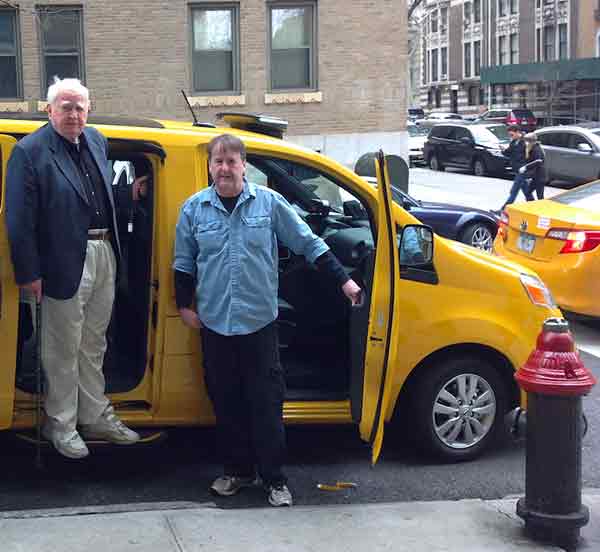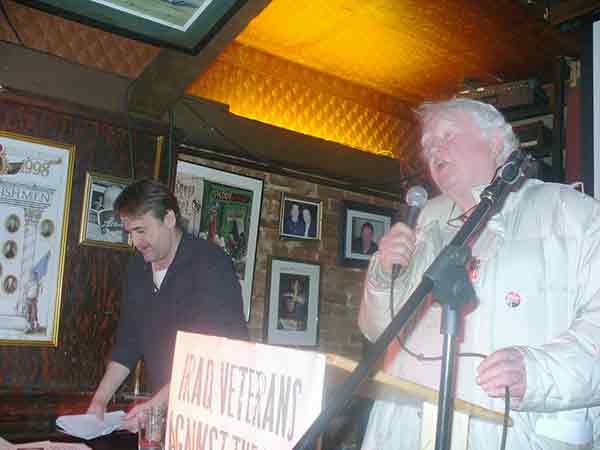I was first introduced to Malachy McCourt when I was in the kitchen of my house in Queens and my mother from Co. Donegal was listening to the wireless as she called the radio and she said to me, "who could listen to that man. He claims he's from Ireland.” As angry as his comments made her she was a faithful listener, and I wondered what was it about him that made her listen to someone she didn't like. Little did I know that the voice coming out of the radio in Queens in 1972 would change my life.
When I got out of the Army in 1975 and started driving a cab, I got a show on WBAI radio because of my strong connection to Ireland. Malachy McCourt had just been fired from WMCA radio for being against the Vietnam war, and also ended up at WBAI with a show where being against the Vietnam war was a plus.
Our lives would crisscross for the next 40 years. We did fundraisers together. We went to demonstrations together, were guests on each other’s shows and became friends. Malachy was then off the radio for many years until a little over 10 years ago when WBAI gave me a 2 hour slot every Wednesday morning to cover all things New York City. I asked Corey Kilgannon from the New York Times to join me as co-host, and I decided to ask Malachy to see if he wanted to be part of this new show. Malachy had always worked solo and didn't need a side kick so I thought he would never do it, but to my surprise he said he would. When that show ended, we moved time slots at WBAI to doing a show every Sunday and for the last ten years I have been laughing each week at Malachy’s stories. It has been the greatest time I have ever had on the radio, and there hasn’t been a single show that hasn’t been fun.
Malachy and New York Cabbie, John McDonagh
Malachy and I have shared the stage at, among others, the Irish Arts Center, the New York Irish Center in Queens An Bael Bocht in the Bronx, Rocky Sullivans, The Brooklyn Cafe, The Irish Repertory Theatre, and most recently, Q.E.D. in Astoria. We fit well together. I would say “so, Malachy . . .” and for the next half hour, he would keep people in stitches with his quick wit and stories. His take on the world was uniquely Malachy, invariably funny and always spot on. As he liked to say “I can’t wait to hear what I’m going to say next.” Malachy was up for anything. A month before he passed away, he came in his wheelchair out to Queens to help christen the opening performance of a monthly storytelling show I am producing at Q.E.D. in Astoria. He didn’t hesitate to agree to drive himself through the room in his motorized wheelchair sporting a blinking glow in-the-dark halo, parading behind a piper playing Amazing Grace. As he was ranting to the crowd about some aspect of organized religion his headpiece slipped, and no one laughed harder than him at the thought that he had just lost his halo. Malachy was genuinely interested in everyone he met, and as someone who frequently drove him places, knew when it was time to leave it would take forever to get to the door, as everyone knew Malachy, wanted to talk to Malachy, and there was nothing he liked better than having a chat.
While we were doing the show, I was working on a one man play about 40 years of driving a cab in NYC. I had been telling stories about driving a yellow cab in Rocky Sullivan's on Lexington Avenue in New York, and with Malachy’s encouragement, began showcasing the stories at the Irish American Writers and Artist salon which Malachy and Larry Kirwan founded. Malachy then made a phone call that would change my life. He called his friend Ciaran O’Reilly, founder of the Irish Repertory Theatre, and said that he should look at what I was doing. Ciaran took my stories and developed them into an off Broadway play that he produced and directed and ran for 3 months at the Irish Rep to rave reviews and sold out shows. Ever since then I have doing the play all over New York, Boston and across Ireland - all thanks to Malachy’s phone call. As Malachy and his brother Frank also starred in shows at the Irish Rep, I couldn’t be prouder to have shared the same stage.
And that was Malachy. He wouldn’t hesitate to help out an artist when he could. If you had a book being published in New York that book would not be complete with a quote from Malachy. He gave helpful criticism but was also the biggest supporter, and didn’t hesitate to use his impressive collection of people in high places to help out someone just getting started.
Doing Radio with Malachy was a joy but could also be torture. We would have all the guests lined up for the show, but Malachy, who went out almost every night, would invariably have come across someone at the last minute, and have invited them on to the show, requiring massive juggling on my part. While being able to broadcast from home was in many ways a blessing when Malachy became restricted to a wheelchair, trying to get him used to technology like zoom was incredibly stressful. Somehow, with the help of his family, we’d muddle through. Right up until the end, doing the radio show was a source of joy for Malachy, and his top priority. A week before he died he was in a rehab facility. There, at the end of his bed, was his list of medications and schedule of physical therapy and doctor’s visits. At the top of the list “ On Sunday from 11-12:30, WBAI Radio Show,” Malachy making sure the nursing staff knew to keep his schedule clear.
While doing the show with Malachy, I knew that one thing a guest should never do was say that he grew up poor. Malachy would ask, “did you have a bathroom in your house?” If the guest said yes, he would tsk say “and you say you grew up poor . . .” then tell him about growing up in the lanes of Limerick, and what poor really looked like. You could not out-poverty Malachy. Not matter how poor you grew up, after listening to Malachy talking about his life in Ireland you’d believe you grew up middle class compared to him.
Malachy was treated like royalty in New York, winning many awards, among them having March 17th deemed Malachy McCourt Day in New York City, and having the Brooklyn Cyclones baseball team name a night after him. It always made me sad to see the sharp contrast in the way that he and his family were treated back in Limerick. Having traveled all over Ireland, you can see that most towns and villages are very proud of the people that came from there. In Derry every one takes pictures at the Free Derry Wall and the wall mural of the Derry Girls. In Ballyshannon, there is a wall mural and statue of Rory Gallagher. Dublin is awash with murals statues and plaques of their famous writers and artists. But in Limerick you would never know that Frank McCourt wrote the pulitzer prize winning book Angela's Ashes. There is no wall mural of the McCourts, or street named Angela's Way. Malachy and Frank are like the Rodney Dangerfied of Limerick "they don't get no respect.”
Malachy and I always started our show singing along to a recording of Malachy and Frank singing the Bells of Hell from their play “A couple of Blaguards.” I will continue to start each show the same way for as long as I am on WBAI. Fortunately, I have an extensive catalog of Malachy recordings, and his voice and stories will continue to be in the airwaves of New York City . It’s going to take a long time to get used to not being able to pick up the phone and talk to him. But Malachy’s rich legacy will live on, and we will continue to obey his command: “sing, children.”
Sidebar
Magazine menu

 Irish American News
News for the Irish in America
Irish American News
News for the Irish in America
27
Sat, Apr





